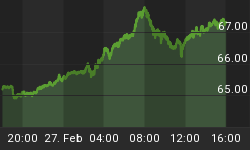The Great Ron Paul (no factiousness intended as Dr. Paul is truly one of a kind), has once again stymied the not-so-great Bernanke. After listening to Bernanke ramble on about people buying precious metals because of tail risks*, Mr. Paul finally interrupted and asked Bernanke point blank: 'Do you think gold is money'? Bernanke's answer, after an awkward pause, was as follows:
"No"
And what, pray tell, is money Mr. Bernanke? Is it seen in the unbacked fiat experiments that after a mere 40-years of floating freely are already showing signs of sinking? Or perhaps 'money', as Bernanke might define it, is whatever someone in his position can debase at a press of a button? Like a chorus acquiring added meaning with each repetition in song, consider, once again, Bernanke's 2002 words:
"Like gold, U.S. dollars have value only to the extent that they are strictly limited in supply. But the U.S. government has a technology, called a printing press (or, today, its electronic equivalent), that allows it to produce as many U.S. dollars as it wishes at essentially no cost. By increasing the number of U.S. dollars in circulation, or even by credibly threatening to do so, the U.S. government can also reduce the value of a dollar in terms of goods and services, which is equivalent to raising the prices in dollars of those goods and services. We conclude that, under a paper-money system, a determined government can always generate higher spending and hence positive inflation."
Bernanke's Nightmare
As anyone with common sense is well aware, gold is money! To be sure, gold is used across the globe as a medium of exchange, government's mint gold/silver coins, central banks (increasingly I might add) squirrel away gold to reduce their exposure to worthless paper, and gold has served as a store of wealth for thousands of years. As for Bernanke's contention that gold is just an 'asset' that central banks like to hoard because of 'tradition', perhaps he should consider the current fragile state of the 4-decade old USD hegemony tradition before he goes throwing stones.
In short, Bernanke, and all central bankers for that matter, despise gold because it is a competitor to their brand of money. Unimaginable to most - at least until the dollar crisis actually arrives - when enough people hoard gold Bernanke or his successor will be out of a job.
* Reckless central bank money printing, not vague tail risks, are likely the primary reason for the increased interest in precious metals in recent years.
MR. PAUL: Do you think gold is money?
(Pause.)
MR. BERNANKE: No. It's not money, it's a precious metal...
MR. PAUL: Even if it has been money for 6,000 years, somebody reversed that and eliminated that economic law?
MR. BERNANKE: Well, it's - you know, it's an asset. I mean, it's the same - would you say Treasury bills are money? I don't think they're money either, but they're a financial asset.
MR. PAUL: Well, why do - why do - why do central banks hold it if it's not -
MR. BERNANKE: Well, it's a form of reserves. It's a form -
MR. PAUL: Why don't they hold diamonds?
MR. BERNANKE: Well, it's tradition, long-term tradition.
MR. PAUL: (Chuckles.) Well, some people still think it's money. I yield back. My time is up.















